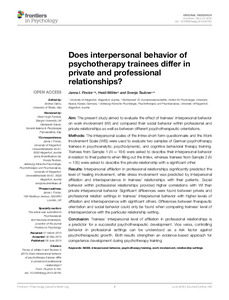| dc.date.accessioned | 2015-07-01T11:35:03Z | |
| dc.date.available | 2015-07-01T11:35:03Z | |
| dc.date.issued | 2015 | |
| dc.identifier.issn | 1664-1078 | |
| dc.identifier.uri | urn:nbn:de:hebis:34-2015070148700 | |
| dc.identifier.uri | http://hdl.handle.net/123456789/2015070148700 | |
| dc.description.sponsorship | Gefördert durch den Publikationsfonds der Universität Kassel | |
| dc.language.iso | eng | |
| dc.rights | Urheberrechtlich geschützt | |
| dc.rights.uri | https://rightsstatements.org/page/InC/1.0/ | |
| dc.subject.ddc | 150 | |
| dc.title | Does interpersonal behavior of psychotherapy trainees differ in private and professional relationships? | eng |
| dc.type | Aufsatz | |
| dcterms.abstract | • Aim: The present study aimed to evaluate the effect of trainees’ interpersonal behavior on work involvement (WI) and compared their social behavior within professional and private relationships as well as between different psychotherapeutic orientations.
• Methods: The interpersonal scales of the Intrex short-form questionnaire and the Work Involvement Scale (WIS) were used to evaluate two samples of German psychotherapy trainees in psychoanalytic, psychodynamic, and cognitive behavioral therapy training. Trainees from Sample 1 (N = 184) were asked to describe their interpersonal behavior in relation to their patients when filling out the Intrex, whereas trainees from Sample 2 (N = 135) were asked to describe the private relationship with a significant other.
• Results: Interpersonal affiliation in professional relationships significantly predicted the level of healing involvement, while stress involvement was predicted by interpersonal affiliation and interdependence in trainees’ relationships with their patients. Social behavior within professional relationships provided higher correlations with WI than private interpersonal behavior. Significant differences were found between private and professional relation settings in trainees’ interpersonal behavior with higher levels of affiliation and interdependence with significant others. Differences between therapeutic orientation and social behavior could only be found when comparing trainees’ level of interdependence with the particular relationship setting.
• Conclusion: Trainees’ interpersonal level of affiliation in professional relationships is a predictor for a successful psychotherapeutic development. Vice versa, controlling behavior in professional settings can be understood as a risk factor against psychotherapeutic growth. Both results strengthen an evidence-based approach for competence development during psychotherapy training. | eng |
| dcterms.accessRights | open access | |
| dcterms.bibliographicCitation | In: Frontiers in psychology. - Lausanne : Frontiers Research Foundation, 2015, 6, 765, 1-12 | |
| dcterms.creator | Fincke, Janna I. | |
| dcterms.creator | Möller, Heidi | |
| dcterms.creator | Taubner, Svenja | |
| dc.relation.doi | doi:10.3389/fpsyg.2015.00765 | |

